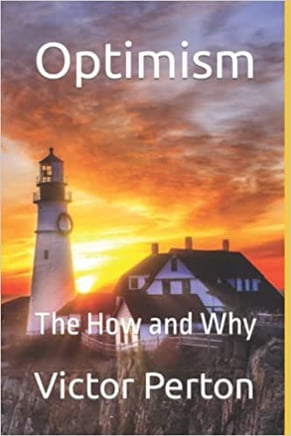Laugh like an Optimist
Life may have many difficulties, but there’s usually a funny side to every situation.
By Victor Perton, Author of "Optimism: The How and Why"
Tell a joke today. Watch some comedy and make sure you laugh out loud. Practice laughing for the fun of it.
Life may have many difficulties, but there’s usually a funny side to every situation.
At the Centre for Optimism, we often end even the most serious conversations with a minute of laughter yoga led by or inspired by our friend the globally-renown laughter expert Ros Ben-Moshe. You can imagine our delight when Ros offered to lead us in laughter during our Australia lockdowns and recovery from the pandemic. Ros teaches laughter and wellbeing at La Trobe University.
In our Project Optimism “Habits of an Optimist” free online course, the laughter unit is immensely popular. It is narrated by Ahmad Imam who lives by the mantra “Your best is yet to come.”
University studies have shown laughter can improve your immune system. increase disease fighting antibodies and lower inflammation in the body. Laughter increases heart rate and blood flow, and has similar health benefits to exercising. Endorphins are released during laughter, which helps to relieve pain, reduce cravings and stress, and slow the ageing process.
On the science of laughter, my colleagues at Project Optimism Jenny Boymal and Nóirín Mosley wrote, “When you laugh, it doesn’t just lighten your mood, it actually induces physical changes in your body. Laughter can: Stimulate many organs. Laughter enhances your intake of oxygen-rich air, stimulates your heart, lungs and muscles, and increases the endorphins that are released by your brain. Laughter also burns calories. When we laugh, the muscles between our ribs start to perform large, strong contractions. This squeezes air out of us, and makes a noise – each ‘ha ha’ in a laugh reflects one of these contractions.”
“We don’t do much else to shape the noise of laughter – it’s a very basic way of making a sound. Finally, laughter releases powerful endorphins. One recent study on laughter shows that laughing with others releases endorphins in the brain—our own homegrown ‘feel good’ chemicals, via opioid receptors. It’s really good for our bodies.”
My cousin Karina Wegner is a psychologist in Australia’s sub-tropical Hervey Bay. Karina’s well-researched expert opinion is that “you should have as much fun as possible and laugh as much as you can. When you couple these together, you should be able to keep ‘depression’ (what they now call the disease of the 21st century) away. When you enjoy yourself and laugh, you will increase the serotonin levels in your body, thereby decreasing the risk of depression. When my clients leave my office in Queensland’s Hervey Bay, my practice manager makes sure the client is laughing or at least smiling before they leave.
“I have a waiting list of near three months and my clients travel long distances to see the “Optimistic Psychologist.”
As the long-running magazine Readers Digest has always said, “Laughter is the Best Medicine.”
Humour can alleviate feelings of stress and depression.
Laughter is a good sign of leadership. In The Tough-Minded Optimist by Dr Norman Vincent Peale, Dr Peale describes a man who "emanated vitality, life, optimism. I decided to see what made him tick, as they say, and went in search of him, I found him regaling several people with stories that had them all laughing. This one man was refurbishing the atmosphere for everyone."
When we think of the hero-President, Volodymyr Zelenskyy, he has used laughter and comedy in his leadership development and building a supporter base. He founded The League of laughter NGO.
So too the Dalai Lama who punctuates his speeches and interviews with laughter and humour.
It’s not always easy but when family and colleagues test your patience, put a smile on your face - even forced ones help. Try to find the humour in the situation and make a light-hearted comment. Not always easy, but give it a go!
Even in grief, laughter can be a relief. In the excellent resource “Grief: How Should an Optimist Comfort and Support the Grieving?” written with Trish Vejby and Christy Roberts we ask “How does an optimist comfort the grieving?” with one of the recommendations “Share stories, fond memories, things you loved about them – encourage laughter and tears.”
In our 2021 survey on optimism, an anonymous answer which appealed to me was “What makes me optimistic? Having an amazing family and friends who share both laughter and support during difficult times.”
Another participant shared, “Life has made me optimistic - knowing things go up and down as part of life. But from a pandemic perspective it has helped to be able to observe and be grateful the things that never really change around me, like the beach, the magpies in the morning and having a laugh with my parents about the anxious antics of our ancient ginger cat in the winter.”
Project Optimism’s Jenny Boymal and Nóirín Mosley suggest:
- Watch a funny movie with your friends and family;
- Invite your friends out to a funny movie or play;
- Surround yourself with people who make you laugh;
- Share a joke with friends;
- Do something spontaneous and silly;
- Play and laugh with children; and, Remember some of the funny things that have happened in your life.
.jpeg?width=916&name=Glass%20Half%20Full%20from%20Philosophy%20Matters%20(1).jpeg)
Laughter Yoga International
"Laughter helps to create a positive mental state to deal with negative situations and negative people. It creates hope and optimism to cope with difficult times."
Arthur Brooks in The Link Between Happiness and a Sense of Humor
"Positive humor is associated with self-esteem, optimism, and life satisfaction, and with decreases in depression, anxiety, and stress. Negative humor follows the exact opposite pattern: While it can feel good in the moment, it exacerbates unhappiness."
Charlie Brooker
“A lot of satire is optimistic about the human condition. It’s pointing out where things have gone wrong, so you have to believe that things could go right.”
Laurent Saurisseau (Riss) in the satirical newspaper Charlie Hebdo ten years after the terrorist attack on its offices and staff.
"Satire has one virtue that has got us through these tragic years – optimism. If people want to laugh, it is because they want to live."
Have I told you about the Russian optimist and the Riussian pessimist?
The pessimist says, "Things could not get worse."
The optimist says, " Oh yes they can."
An optimist is someone who brings a book to read for an eye dilation test.
A psychiatrist has one son who is a total pessimist, and another who is a complete optimist. He decides on an experiment. For Christmas he fills the pessimist’s room with hundreds of beautifully wrapped gifts, and dumps a heap of horse manure in the optimist’s room. On Christmas morning he sees the pessimist boy sitting motionless at the center of his room, eyeing his gifts suspiciously. But over in the optimist’s room he sees his boy filled with joy, digging happily in the odorous pile. He asks the kid what he’s doing and he answers: "Daddy, with all this horse dung, there’s gotta be a pony in there someplace.”
The optimist says the glass is half full.
The pessimist says the glass is half empty.
The communist says the glass is too full, and needs to be redistributed among the other glasses.
The pessimist says "The glass is half-empty!"
The Optimist says "The glass is half-full!"
The Proactive person says "Actually, the glass is full. I refilled it while you were arguing. You're welcome."
The optimist says the glass is half full.
The pessimist says the glass is half empty.
The engineer says the glass is over-designed for the quantity of water.
The optimist says the glass is half full.
The pessimist says the glass is half empty.
The inquisitive troublemaker wants to know what's in the glass anyhow...
The optimist says the glass is half full.
The pessimist says the glass is half empty.
The worrier frets that the remaining half will evaporate by morning.
The optimist says the glass is half full.
The pessimist says the glass is half empty.
The project manager says the glass is twice as big as it needs to be.
The optimist says the glass is half full.
The pessimist says the glass is half empty.
The entrepreneur sees the glass as undervalued by half its potential.
The optimist says the glass is half full.
The pessimist says the glass is half empty.
The Marketer says "Your glass needs re-sizing"
The optimist says the glass is half full.
The pessimist says the glass is half empty.
The physicist says that the glass is not empty at all - it is half-filled with water and half-filled with air - hence, fully filled on the whole!
The optimist says the glass is half full.
The pessimist says the glass is half empty.
The seminar presenter does not care if the glass is half full or half empty, he just knows that starting the discussion will give him ten minutes to figure out why his PowerPoint presentation is not working.
The optimist says the glass is half full.
The pessimist says the glass is half empty.
The quantum physicist would say that the water could be inside the glass, or outside the glass, or both, or neither … simultaneously. It could actual water or a mere wet vector.
(Shared by Nick Ryan who concluded "We need quantum optimism.")
The optimist says the glass is half full.
The pessimist says the glass is half empty.
The pedant says the glass contains half the required amount of liquid for it to overflow.
The optimist says the glass is half full.
The pessimist says the glass is half empty.
The journalist/broadcaster "asks" how can we all share your glass and smile for the camera, please?
(From Donagh McKeown)
Miz Feiler, Blogger
"My mother is an optimistic. She taught me to be one too. But now that I am a mother, also juggling a business and a multitude of daily tasks, I understand that it is not always enough for one’s glass to be half full. Sometimes you need to fill that wine glass right to the top."
“I put my application in for the Optimist Club.......but I don’t think I’m going to get accepted.”
Attributed to Steven Wright
Here are three things to keep in mind every morning:
— Abbie Nwaocha (@ForHerEmpire) July 12, 2020
1. Live every moment, both good and not so good
2. Laugh every day, laughter is the best medicine and the little optimism and positivity it brings will spread to those around you
3. Love beyond words#Mindfulness #Positivity pic.twitter.com/u9t4fpJwMn
Read inspiring quotable quotes in "Optimism: The How and Why" by Victor Perton, CEO of The Centre for Optimism.
Kay Clancy, Transformation Specialist
"I am a contagious optimist Victor Perton. Just like laughter is contagious and hearing someone laugh can break you through even the darkest of times and make you laugh, I believe that each of us has within us the resources to find a brighter outlook, we just sometimes need someone to help us unlock that. "
“Our thoughts create our feelings and our feelings influence our actions and our words. The words we use and the actions we take have an impact long after the words are spoken or the action taken. This becomes our ripple. We have the opportunity to choose our ripple. In the moment of choice choosing optimism creates a space where you step into a positive frame of mind creating positive words and actions and a lasting positive ripple.”
Rita Wirtz
 Project Optimism has produced "The Optimist's Gratitude Journal: 100 days to share and develop your gratitude" which is very helpful.
Project Optimism has produced "The Optimist's Gratitude Journal: 100 days to share and develop your gratitude" which is very helpful.
See https://www.amazon.com/Optimists-Gratitude-Journal-develop-gratitude/dp/B09MC5ZNPX


.svg)